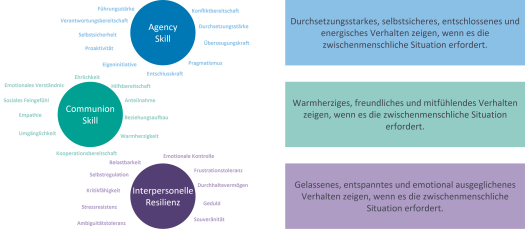Conceptualization of social skills
Our understanding of social skills can be described along four central questions. They form the basis of our scientific work at the CeSoS.
Our understanding of social skills can be described along four central questions. They form the basis of our scientific work at the CeSoS.
Social skills are key qualifications for a fulfilling and successful life. They enable people to act appropriately, effectively and flexibly in social situations, both in their private and professional lives.
People with strong social skills can (among other things)
Social skills not only strengthen individual well-being and professional effectiveness, but also contribute to a society that is respectful, cooperative, and resilient.
The term “social skills” - sometimes also referred to as social competencies - is often used inconsistently in science and practice. We adopt a behavior-oriented understanding of social skills:
Social skills encompass the entire range of skills (competencies) that promote effective functioning in interpersonal situations and manifest in how well people manage to display certain behaviors when the interpersonal situation requires it.
In other words, they relate to what people can do in social contexts to interact constructively, shape relationships, achieve goals together or deal with challenges when working together. Our focus lies on actual behavior, i.e. what people do in specific situations when it matters. It is less about typical behavior or potentials and more about how well they manage to act appropriately at crucial moments.
Social skills should be distinguished from interpersonal styles, i.e. relatively stable patterns of social behavior as described in a classic understanding of personality traits. These styles refer to how people typically behave in social situations - for example, rather assertive, reserved or empathetic. They reflect average behavior across different situations.
Social skills, on the other hand, refer to maximum behavior. They describe how well people manage to display certain behaviors when a specific social situation requires them. A person who is rather reserved in everyday life can act convincingly and assertively at crucial moments.
Various approaches have been developed in research to categorize social skills. These are often based on so-called top-down models: Relevant skills are derived from theoretical concepts, requirements analyses or expert assessments and systematically summarized. Such models provide valuable information on which social skills are considered important in different contexts. However, they often differ in number, structure and level of abstraction.
We supplement these theoretically based approaches with a behavior-oriented and empirically supported perspective. The starting point is the actual behavior of individuals in social situations. The aim is to analyze how individual differences in behavior manifest themselves and how empirically meaningful patterns can be derived from this. This is because social skills can only be reliably assessed and specifically promoted if there are clear differences in behavior.
Based on our research, we distinguish three core areas of social skills. These three areas enable a differentiated, behavioral description of social skills. Depending on the situation, they can be relevant individually or in combination.

More information on the assessment can be found here: More about assessing social skills